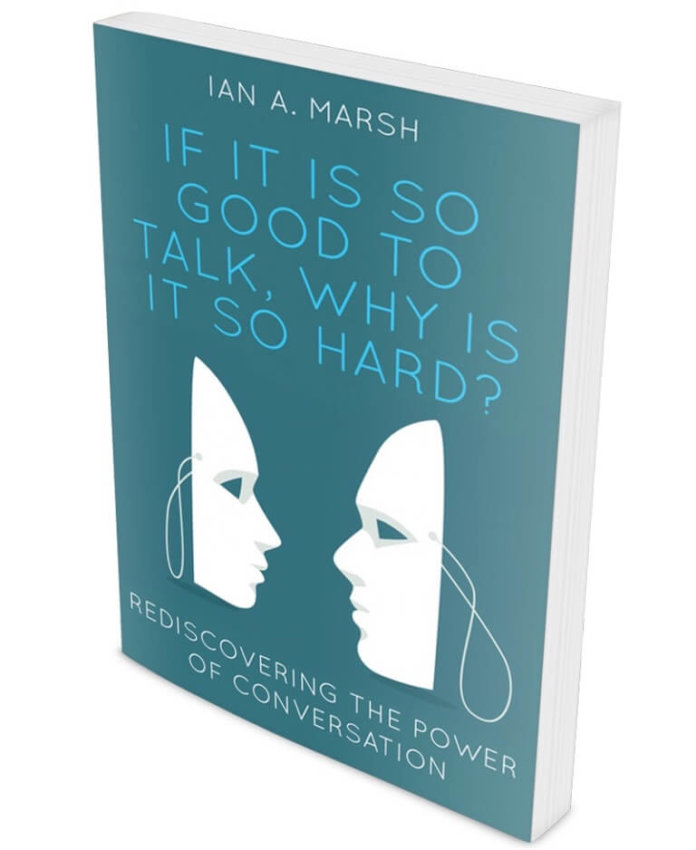

Too often, family issues can spill over into the workplace where a lack of communication or longstanding resentments can begin to affect the bottom line. When this happens, many in family businesses can feel overwhelmed with frustration and unsure where they can turn for help.
Enter Ian Marsh.
Marsh is a London-based specialist in family dynamics and communication who authored the recently published book If it is so Good to Talk, Why is it so Hard. The book is the product of 40 years’ experience in working with families as an adviser. The book explores the principles of interpersonal neurobiology and it impacts family dynamics.
When called upon, Marsh takes an active role to help family businesses in crisis by serving as a listener, communications and conflict coach, facilitator and mediator to families around the world, helping them to have the difficult conversations. Discussions which most often center around succession and governance.
Recently Tharawat Magazine had the opportunity to sit down with Marsh to discuss how these communication breakdowns tend to occur, how our biological and psychological makeup renders us predisposed to them and how to effectively deal with our mind monkeys.
To purchase If it is so Good to Talk, Why is it so Hard, please visit the following links:
For UK readers, click here.
For International readers, click here.
I’d like to start with the notion of whether good communication is something that comes naturally to people or if it is a learned skill. You’ve said before, it’s actually not something apparently that comes naturally to anyone. So, is what you’re saying essentially that this is something that we always should be working on very consciously?
I actually think we do know how to do it. I just think we’ve maybe forgotten. We struggle with a Neolithic brain in a digital age. You’ve heard of ‘fight/flight’. Most people have heard of ‘fight/flight/freeze’. Some of the work I came across was by a guy called Stephen Porges when I was researching the book. He’s reclassified it as ‘socialization, mobilization, and immobilization’. He says that our default mode is to socialize. We need to socialize partly because we’re mammals and our offspring have a very long period of immaturity. If we don’t cooperate, their chances of getting to adulthood aren’t great.
But when we perceive a threat, we trip into mobilization mode. And at that point really interesting things are happening in our bodies. The way our ears work changes. We can’t pick out one voice in a crowd anymore. The pitch in our voice changes. We’re sending out different signals. The muscles in the face freeze, so we can’t mimic what other people’s faces are doing. So, it’s harder for us to read their minds. So, we’re becoming cut off. And that’s where we lose the easy ability to communicate.
I think we can almost reframe the fear piece of Porges’ work as if all the stressors that are being piled on us exceed our bandwidth to cope with those stressors, then we click into mobilization mode.
So how do we cope with this so those around can hear what we’re saying?
One of the approaches I take is to try to keep the person we’re talking to in social mode, because if they go into mobilization mode they’re going to hear nothing. I think one of the classic examples, which I mention in the book, is talk to anybody who has had a cancer diagnosis. They here the C word, and they hear nothing the doctor says to them in the rest of that interview.
And it happens on a much more trivial level in a lot of our conversations. You have the right conversation, but at the wrong time, in the wrong place and all these stresses are brought to you and you shut down. So, if we know that, take some responsibility for it.
So, from your experience, where do you see that challenge arising the most? A lot of people keep on saying that it’s usually an intergenerational issue. Others say it can be a male-female, like a gender-based problem as well.
I think it’s more individuals. I think the way it presents is possibly different in each of those cases. The succession issue is so huge that there is a lot of angst around that. There are people who are being asked to do things they don’t want to. There are people being denied things they do want to do. There’s the whole birthright thing comes into it in some families and all the conversations that have and haven’t taken place up to that point.
I think individual family culture is probably as big an influence as anything else. Families can create a space in which it’s easier to communicate. They can create a space in which people are most relaxed, so they connect more easily, and they can have open conversations. And some families just do it naturally. But other families are not deliberately, obviously, but they create the opposite. And every communication can then become a challenge. And I guess the vast majority are somewhere on that spectrum in between.
You’ve been a huge advocate of mindfulness for a very long time. So, can you talk about the difference between ‘mindfulness’ and also ‘self-awareness’, and how these things play into becoming better at talking to other people?
I think the difference between ‘mindfulness’ and ‘awareness’ lies in the degree of focus. I think the first exercise in being mindful is learning to focus on one thing to the exclusion of others. That becomes really useful in being able to focus completely on the person you are talking to. But it’s really difficult to do that if you can’t first deal with the stuff that’s going on in your own head.
I think also being mindful is non-judgemental and non-reactive, so if you are doing an exercise where you are being mindful of what’s in your own body and mind. This means being aware of it, but not to reacting to it. You may notice that you feel a particular emotion and it’s unpleasant. So, you notice the unpleasantness rather than getting lost in it.
Are we yet talking about my favorite phrase in your book – ‘mind monkeys’? Is this having control of mind monkeys? You say, “Mind monkeys do not need much rest, and they breed like rabbits.” So, just to refer to what you just said, is this basically gaining control of those mind monkeys and not letting them run the show?
I think it’s certainly not letting them run the show. I’m not sure that you actually control them, I think it’s more that you let them play their games and don’t get drawn into it.
There’s reference in the Buddhist text to ‘monkey mind’, which was an interesting expression. For me, that image is a troop of monkeys swinging from one thought to the next and spinning stories in my head was just how I experience it when they get going.
So, yeah. I think learning to live with your mind monkeys is something we all need to do.
I think one of the greatest challenges that we see in family businesses is probably that we tend to focus on the other person. Do you have any tips for our listeners, Ian, as to how you can free yourself from that and start focusing on your own way of communicating in order to facilitate change?
I think there are several things you can do. I think one of the biggest traits you can try and cultivate is curiosity. Because I think our natural way of being is to assume that everybody else sees the world like we do. And there is just so little evidence for that.
So, one of the things that is so powerful for me was the realization that it is not an impossibility, but it’s statistically incredibly remote that anybody has identical world experience, life experience than I do. And I think when people take different views, the rational thing to do is to find out why. Why is your experience so different from mine?
One way to articulate it is, instead of going on the offensive, just to say gently, “Do you realize that when you do this, this is what I feel?” And most people are really shocked when you do that. Because it generally wasn’t their intention to create that reaction. And if they’re not aware they’re having that effect on you, what reason do they have to change? If you tell them they’re having that effect, then change can begin. If you do it in a non-aggressive, non-threatening way, they’re more likely to hear.
If I’m in a family business and I see communication getting stuck, how can I foster curiosity in myself and also in others to explore and challenge their own views?
I think the first thing that you don’t do is tell them to be more curious. Why should I be more curious? I’m very curious. As with a lot of things, the starting point is to model the behaviour you want. So, if you become more curious, manage to do it in a non-irritating way, then other people may start doing that around you.
And I think that’s true of the communication as well. It’s great if a whole family will commit to trying to improve its communication, but one person changing the way they do things on a consistent basis will change what happens within the group. And strange things happen then.
I think the simple act of asking more questions becomes a self-fulfilling prophecy. I think if you can consciously make yourself enquire more, you will do it more readily and more readily. And there are so many things in the sorts of situations you described where our instinct is to make a statement. If you could reframe that into a question it produces a different outcome. We’re almost primed, particularly in that sort of scenario, to become adversarial when statements are exchanged. Whereas asking questions, particularly non-leading open questions, starts drawing people into the conversation. And in my experience, they tend to follow suit. Not necessarily in their first few sentences. But, if that becomes a practice with them, people will adopt the behaviour.
In terms of establishing better communication, what are the tangible goals that you can work towards?
I see it as a lifestyle, not an objective. It’s the difference I think between wanting to lose weight and choosing to have a healthy diet, which will probably cause you to be a different weight. I don’t see this as a program which ends up with, “Oh look. I’m more skilled now.” It’s a way of interacting with other people.
And will that evolutionary older part of you that wants to hide or thump people go away? No, of course it won’t. Will you still have really bad conversations that go wrong? Yes. But, you will have fewer the more you practice this stuff.
And if you come back to the mindfulness piece of it, you’ll likely find it becomes a more instinctive part of life. And that life is easier because people hear what you say, and you hear what they say more often.









